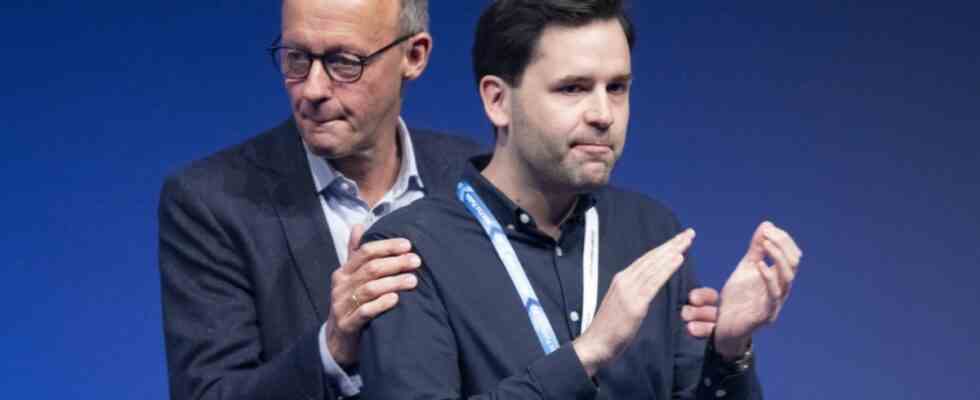Of course Otto Wulff was there again this time. The man is head of the Seniors’ Union. He is now 89 years old. And he insists on visiting every Deutschlandtag of the Junge Union. The last time, the JU greeted him with the march “Preußens Gloria”. This time Wulff comes with a walking stick. As he begins his speech, he hangs his cane on the lectern. And when he ends it, he says: “Long live our beloved German fatherland, in a united Europe, in peaceful coexistence with the peoples of the world.” Down in the hall, the delegates from the Junge Union stand up and applaud frantically.
Otto Wulff can still talk about conversations with Konrad Adenauer. He now sits on the CDU federal executive board with women like 26-year-old Wiebke Winter from the Junge Union. That is the bandwidth of the CDU.
The Deutschlandtag of the Junge Union met in Fulda this weekend. The last one took place in Münster – three weeks after the catastrophic defeat of the CDU in the general election. At that time, the CDU grandees had to put up with tough questions. Armin Laschet personally took responsibility for the election defeat in Münster. JU boss Tilman Kuban said that Laschet “presented” himself to JU in this way, proving his character. The praise was also a tip against Markus Söder, who had canceled participation in the Germany Day at short notice.
The CSU boss did not appear in Fulda either, he only sent a video greeting. And so the attention is focused on Hendrik Wüst and Friedrich Merz – the other two Union politicians who are traded as possible candidates for chancellor.
During his appearance, Wüst defends himself against “fake news” allegations from the traffic light coalition. “Anyone who tries to silence the opposition in the center risks damaging public discourse and democracy,” says the North Rhine-Westphalian Prime Minister. He accuses the chancellor of taking too hesitant a policy. In addition, cohesion is needed, especially in a time of crisis, says Wüst. But there was always a fight at the traffic light.
And Merz? On Germany Days, the speakers come into the hall with marching music. The lights are dimmed and the speakers are booming. Merz runs to the Queen song Don’t Stop Me Now toward the stage. At this moment one would like to know what Freddy Mercury thinks of the performance. When the CDU leaders celebrated their triumph in the 2013 federal elections with a song by Die Toten Hosen, the band complained. Angela Merkel therefore called Campino a few days later to justify herself. But Mercury has been dead for thirty years.
On the stage, Merz calls on the traffic light coalition to make concessions in the dispute over citizen money. “We expect this government to take a step, and a big step towards us, if we want to find a common solution for this so-called citizen’s income in the next few days and weeks,” says Merz. It is important to create incentives so that the unemployed can find their way back into the labor market as quickly as possible. In Germany, all available workers would be needed. “That can also, that must also be accompanied by sanctions.”
In the past few weeks, Merz has mainly dealt with all kinds of attacks at the traffic lights. In Fulda, the CDU leader is now also talking about his plans for the labor market, energy supply and climate policy. “I want no one in Germany to have any doubts that we take this issue seriously in the Union,” says Merz.
The CDU boss is concerned that the Union is not increasing in the polls, despite what he considers to be the catastrophic work of the traffic lights. And that the competence values for the CDU are not good in many areas. Merz now obviously wants to try less polemics and more substantive debate. In any case, his appearance is comparatively reserved.
Merz announces that – when the time comes – together with Söder he will present a joint proposal as to who should run for the Union in 2025 as a candidate for chancellor. Because the Union should not go into a federal election again divided, “disputed parties are not elected, period”.
In Fulda, however, it was not just about showing the CDU grandees, a new federal chairman was also elected. Tilman Kuban reached the age limit at the age of 35 – and was therefore no longer able to compete. The only candidate for the successor was Johannes Winkel. Like Merz, the 31-year-old lawyer comes from South Westphalia and was elected with almost 87 percent of the votes.
In his speech, he warned against de-industrialization in Germany. The CDU must be the party that makes Germany a climate-neutral industrial country, demanded Winkel. But he also attacked the “last generation” activists who would damage the social acceptance of climate protection. Overall, it was a restrained, sometimes even thoughtful, and by no means aggressive speech.
Winkel’s predecessors Paul Ziemiak and Tilman Kuban appeared differently. But Ziemiak and Kuban also had opponents in their elections against whom they had to assert themselves. Both therefore had to hold combative application speeches. And both felt compelled to caress the conservative JU base soul with hefty attacks on the political competition.
Incidentally, Kuban’s last day as JU chairman was also his first full day as a father. Immediately before Germany Day, his wife gave birth to a son. Kuban therefore left Fulda on Saturday in the direction of the hospital – to his new little family.

